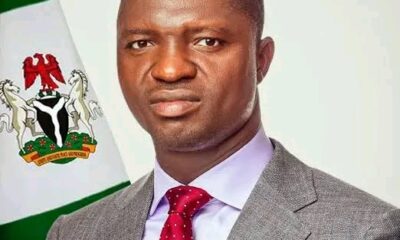News
Governors, LG Chairmen in Stalemate Over Direct Allocation of Funds

The controversy surrounding the federal government’s directive for local government chairmen to open accounts with the Central Bank of Nigeria (CBN) for direct fund disbursement remains unresolved, as both governors and council leaders continue to delay implementation.
Efforts to obtain updates from the key parties involved have yielded little response, with many chairmen appearing reluctant to speak, possibly due to pressure from state governors. Those who did comment largely defended the governors, reinforcing speculation that the matter is being handled behind closed doors.
Reports suggest that state governors have been lobbying President Bola Tinubu to reconsider the directive and allow funds to be paid into commercial banks rather than the CBN, as preferred by the Office of the Accountant-General of the Federation. Some governors have accused local government chairmen of non-compliance, while several chairmen claim they are unaware of any official directive regarding the account opening process.
In Katsina State, the president of the Nigeria Union of Local Government Employees (NULGE), Nasiru Wada Maiadua, dismissed the ongoing debate as misplaced. According to him, the fundamental issue is not the mode of fund disbursement but the lack of full autonomy for local governments. He cited a Supreme Court ruling allowing allocations to be sent through either the CBN or commercial banks, emphasizing that state governors’ control over funds stems from the absence of administrative and political independence at the local level. Maiadua called on the federal government to go beyond financial autonomy and grant local governments full self-governance to ensure genuine grassroots development.
The president of the Association of Local Governments of Nigeria (ALGON), Bello Lawal Yandaki, was unavailable for comment, as he was reportedly in Saudi Arabia for Hajj. Similarly, the Kano State government remained silent, declining to respond through the governor’s media director.
In Nasarawa State, Governor Abdullahi Sule expressed concerns over the prolonged delay in the account opening process, stating that the impasse was affecting salary payments to local government workers. He noted that the state’s 13 local councils had to rely on accrued savings to pay February salaries due to the delay. A government aide quoted the governor as saying that while the process should be straightforward, conflicting accounts from local government chairmen and the CBN had complicated the matter. He explained that while CBN branches in the state claimed they had not received directives from their headquarters, the Abuja office maintained that they were still awaiting account details from the councils.
In Niger State, the government acknowledged the push for local government autonomy but claimed there was no clear template for implementation. While the state ALGON chairman, Hon. Iliyasu Zakeri, affirmed that local governments in Niger State would operate in line with constitutional provisions, the commissioner for Local Government and Chieftaincy Affairs insisted that the state had no role in enforcing the account-opening directive. The commissioner also noted growing public concern over the funding of statutory agencies such as the Universal Basic Education Board and the Local Government Service Commission, which operate under joint state-local government arrangements.
In Bauchi State, Toro Local Government Chairman, Ibrahim Dembo, denied knowledge of any directive to open accounts with the CBN. However, the state’s commissioner for Local Government and Chieftaincy Affairs, Isa Tilde, attributed the delay in salary payments to new modalities introduced by the CBN for fund disbursement. He stated that Bauchi State authorities were awaiting the conclusion of the CBN reforms before taking further action.
Similarly, in Ebonyi State, Onicha Local Government Chairman, Ikechukwu Ogbuofia, said discussions were ongoing between ALGON and the state government to ensure compliance with the CBN directive. The commissioner for Local Government and Chieftaincy Matters, Uchenna Igwe, assured that necessary measures were being put in place and that Ebonyi would not be among the last states to implement the order.
Despite the Supreme Court’s ruling in favor of direct fund disbursement to local governments, the issue has become entangled in bureaucratic delays and political maneuvering. While governors and council chairmen publicly claim to support autonomy, their actions suggest a preference for maintaining the status quo. The continued back-and-forth between stakeholders raises concerns about whether the directive will be fully implemented, or if it will remain stalled in political and administrative disputes.




